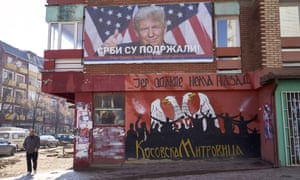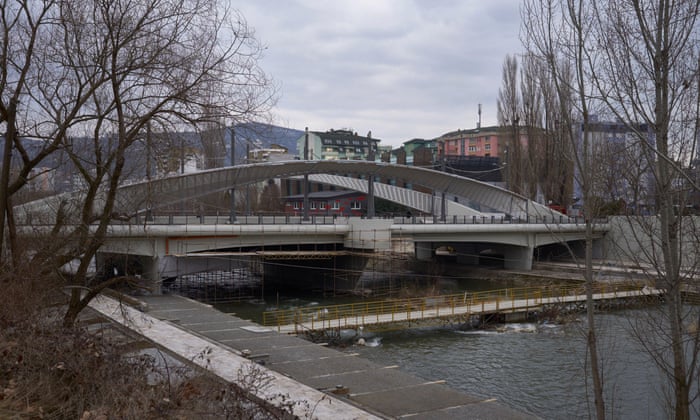In Kosovo, Serbia, Bosnia and Montenegro, signs of ethnic tension are on the rise again
The Guardian

A poster of Donald Trump in North Mitrovica. Photograph: Pierre Crom/Getty Images
Andrew MacDowall in north Kosovo and the Preševo valley
Monday 27 February 2017 14.38 GMT Last modified on Monday 27 February 2017 15.45 GMT
A familiar billboard face looms large over the shabby streets and squares of the Balkan city of North Mitrovica.
“The Serbs stood by him all along!” says the slogan in English beneath the giant image of Donald Trump staring out passersby.
Many in this Serb-dominated city in Kosovo would agree. Serbs were generally delighted with Trump’s election victory, if only because he defeated the wife of their 1990s nemesis Bill Clinton, who led the Nato bombing campaigns against Serb forces in Bosnia and Kosovo.
Now, the Balkans are once again dicing with crisis. Borders are being questioned, ethnic tensions are bubbling up, and land swaps are being mooted as a last resort to prevent a slide back towards violence. Forget China and the Middle East: the former Yugoslavia could yet emerge as Trump’s first real foreign policy headache.
Last month, a row over a Serbian train covered in the slogan “Kosovo is Serbia” in multiple languages sent towards Mitrovica precipitated the worst crisis for years in the region. Most of Kosovo is dominated by ethnic Albanians, who make up 90% of the population.
Though the train was stopped outside Kosovo, Nato members Croatia and Albania have asked the alliance to revise its peacekeeping plan in Kosovo. The Serbian president, Tomislav Nikolić, said that he and his sons would personally take up arms if Serbs in Kosovo were threatened.
“I believe that all these tensions are nothing to do with citizens,” says Adrijana Hodžić, head of the North Mitrovica Administrative Office. “In the north of Kosovo, the hope still exists that they will get rid of fear. I’m personally sick and tired of Pristina and Belgrade, because we’ve been victimised by high politicians.”

Then there is Bosnia. Split between two federal chunks – a Serb part and a Bosnian-Croat part – after a three-year war in the 1990s, it has never healed properly. The autonomous Serb Republic regularly threatens a referendum on independence, while some Bosnian Serbs have threatened to boycott central government institutions over Sarajevo’s move to challenge an international court of justice ruling that cleared Serbia of complicity in genocide in the 1992-95 war.
Separately, there is Montenegro, subject of an extraordinary political convulsion late last year in which the government claimed that Russian institutions had tried to orchestrate a coup.
Finally, Macedonia, the most southerly former Yugoslav republic, is struggling to form a new government following a protracted political crisis in which ethnic Albanians have become increasingly restive. The country fell back into the spotlight when a congressman close to Trump suggested it should be broken up and divided among its neighbours.
“Macedonia is not a country. I’m sorry, it’s not a country,” Dana Rohrabacher, who chairs the congressional foreign affairs committee and has regularly defended Vladimir Putin, said earlier this month, prompting a furious response from the capital, Skopje.
“The situation is catastrophic,” says Belgzim Kamberi, an ethnic Albanian human rights campaigner and senior member of Kosovo’s radical Vetëvendosje party. “Nearly two decades after war, this isn’t peace. The Albanian and Serb question is not closed in the Balkans; it’s Israel and Palestine in Europe.”
Land swaps
As ever, the region suffers not just from its own internal frictions, but from external factors. The EU, hamstrung by its own existential woes, has cooled on expansion into the western Balkans. The Trump administration’s approach is still not entirely clear. Russia meanwhile attempts to project power across a region it sees as within its sphere of influence.
Kosovo remains the crucible. It declared independence from Serbia in 2008 but Belgrade never recognised this. An EU-brokered deal in 2013 promised Serbia accelerated movement towards membership, and Kosovo steps towards candidacy status. But the EU has other crises on its mind now. And the incongruous dividing lines are as palpable as ever.
In northern Kosovo, streets are lined with Serbian flags, the Serbian dinar is the currency, Serbian government companies provide many utilities, and the language spoken on the streets is generally Serbian. Cars cruise around with no number plates; those with official Kosovo plates remove them on entering the north. By contrast, South Mitrovica on the other side of the Ibar river is almost entirely Albanian, and administered separately.
“If you brought someone here to North Mitrovica, they would say this is more Serbia than Kosovo, it’s something fake,” says Hodžić. “I’m not sure it’s sustainable in the end.”
Hodžić says the region might be better off had a land swap been discussed early on in negotiations over Kosovo after the 1999 war. Now, some analysts are floating the idea of a land swap once again – giving North Mitrovica to Serbia in return for the Albanian-majority Preševo valley going to Kosovo.
“Now we need to choose between many bad options,” says Hodžić.
A Serbian nationalist wall painting in North Mitrovica.
Facebook Twitter Pinterest
A Serbian nationalist wall painting in North Mitrovica. Photograph: Pierre Crom/Getty Images
Despite nationalist symbolism, there is little appetite for conflict among ordinary people in the region. Many express a sense of powerlessness in the face of geopolitical machinations by bigger powers.
“The Serb and Albanian people are the last ones to blame. Politicians came between people,” says Vukoje Utvic, 74, a retired ambulance driver. “We have seen enough wars.”
Diplomats in the region also pour cold water on talk of conflict, though they are concerned about politicians ramping up tensions to gain advantage and create distractions amid fraught domestic politics.
“There’s only one potential sponsor for border changes, Russia, which isn’t actually that keen on the idea, and I’m not sure that the new states could actually defend the territory that they would claim,” says one western diplomat with long experience of the region. “I don’t even fear another 2004 [where widespread rioting and attacks on Serbs in Kosovo led to nearly 30 deaths]. Everyone is committed to the Brussels dialogue; changing borders is out of the question. Having said that, people felt that way in Bosnia just before the war, and you wonder perhaps if you have missed something.”
Diplomats describe 2017 as a “nightmare year” for politicking in the region, with elections in Serbia, a growing likelihood of a snap poll in Kosovo, and manoeuvring beginning for Bosnia’s elections next year. The first indictments are also expected from the new specialist court established in The Hague for trials of alleged crimes committed by the ethnic Albanian Kosovo Liberation Army, which could implicate senior members of the territory’s political elite, potentially creating another trigger for instability.
The suggestion of a land swap has also refocused attention on Preševo, a small, impoverished majority-Albanian town in southern Serbia where shepherds graze sheep in the hills that drop down right to the main square. The Preševo valley, which includes the neighbouring municipalities of Bujanovac and Medveđa, was the centre of a conflict in 2001 between the Serbian authorities and Albanian insurgents who had taken control of parts of the area in the wake of the 1998-99 Kosovo war. In 2015 in Kumanovo, a city just 20 miles away across the Macedonian border, a shootout between ethnic Albanian guerrillas and local security forces left 18 dead.
But Shqiprim Arifi, an ethnic Albanian moderate elected mayor of Preševo last year, insists there will be no return to the border shifts and wars of the past. Arifi, who was born and brought up in Germany, points out that he defeated a long-term incumbent who had called for Preševo to join Kosovo, and took an antagonistic stance towards the Belgrade government. Arifi is focused on engaging with the Serbian authorities to tackle the municipality’s 70% unemployment and crumbling utilities.
“We don’t want to change borders,” he told the Guardian in his smart office in the municipal building, where he displays a small bust of the Albanian national hero Skenderbeg. “It’s not in the interests of the region, and it’s not in the interests of Albanians. If they change one border, it’s a Pandora’s box, a chain reaction – Bosnia, Kosovo, Macedonia, Kurdistan. Our only option is to be together within the EU.”
Outside the municipality lies a large wreath commemorating the fighters of 2001, with the words: “Laud the national martyrs across the Albanian lands.” It stands in place of a large and highly controversial war memorial removed by the Serbian police in 2013 under heavy security.
On the streets of Preševo, support for union with Albania and Kosovo is muted, and more prevalent among the young.
“Every person wants to be part of his own nation, to live together, and in the end we will. But it can’t happen now without guns – if it was possible without war, it would have happened by now,” says Drita Murtezi, 24, an unemployed psychology graduate with a degree from the Albanian-language university in Tetovo, Macedonia, as she strolls down Preševo’s broad main street.
But in a cafe on the square filled with knick-knacks and incongruous pounding house music, Kamberi gesticulates with an unlit cigarette as he advocates a united Albania. “If you’re afraid of war, you don’t progress,” he says. “We should be peaceful, but not pacifists.”
No comments:
Post a Comment